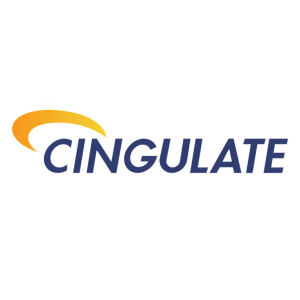Cingulate Announces Detailed Trial Results from Phase 3 Adult Efficacy and Safety Trial of CTx-1301 (dexmethylphenidate) for ADHD
CTx-1301 Demonstrated Clinically Meaningful Improvements in Permanent Product Measure of Performance (PERMP) and Clinical Global Impression Scale (CGI-S) Scores, with Investigators Observing Trend Toward Significance
Treatment Effect Size of 1.41 and 0.98 Observed at 30 Minutes and at Hour 16, Respectively; Currently Available Long-Acting Stimulants Range from 0.5 to 0.91
CTx-1301 Demonstrated a Favorable Safety Profile in the Trial Compared to Placebo
KANSAS CITY, Kan., Sept. 11, 2023 (GLOBE NEWSWIRE) -- Cingulate Inc. (NASDAQ: CING), a biopharmaceutical company utilizing its proprietary Precision Timed Release™ (PTR™) drug delivery platform technology to build and advance a pipeline of next-generation pharmaceutical products, announced full results from the Phase 3 adult efficacy and safety study of its lead candidate, CTx-1301 (dexmethylphenidate), for the treatment of attention deficit/hyperactivity disorder (ADHD), presented on September 8th at the 36th Annual Psych Congress, in Nashville, TN. A poster describing this data was selected as a finalist for the Psych Congress’s First Annual Poster Awards.
The Phase 3 CTx-1301-022 study (NCT05631626) assessed efficacy and safety along with onset and duration of CTx-1301 in 21 adults (age range: 18-55 years) with ADHD in an adult laboratory classroom setting. The data from the trial, presented at the 2023 Psych Congress, did not achieve statistical significance on the primary efficacy endpoint but demonstrated a trend toward significance in improving Permanent Product Measure of Performance (PERMP) scores with CTx-1301 compared to placebo. Clinical Global Impression Scale [CGI-S]) scores with CTx-1301 compared to placebo also showed significant improvements even though the study was not powered for statistical significance.
“Even with currently available extended-release formulations of dexmethylphenidate, many patients require longer duration of efficacy and must add a second, or booster, dose to ensure treatment effect over their entire active day. CTx-1301 is designed to release dexmethylphenidate multiple times throughout the day in just one tablet, with the last release happening around the time that plasma concentrations of other stimulants start to wane,” said Ann Childress, M.D., President, Center for Psychiatry and Behavior Medicine, Inc. and lead investigator. “The treatment effect size of CTx-1301 in this trial was notable – starting at 30 minutes and remaining consistent over 16 hours – and demonstrated the ability of CTx-1301 to improve upon ADHD symptoms in patients over an entire active day. If approved, this would allow physicians to avoid prescribing the immediate-release booster doses that over 60 percent of patients are currently using to extend the efficacy of their medications2.”
CTx-1301 demonstrated a favorable safety profile in the trial compared to placebo. No patients reported experiencing insomnia during the randomized period.
“Along with a restricted duration of efficacy, another limitation of current stimulant-based treatments for ADHD is the phenomena of crash and rebound they produce. This can result in the recurrence or exaggeration of ADHD symptoms,” said Raul Silva, M.D., Chief Science Officer, Cingulate.
“To address this, we designed CTx-1301 to be a once-daily, rapid-onset tablet that is meant to provide entire active-day coverage along with a controlled descent in blood levels to mitigate the crash or rebound by avoiding the precipitous drop in blood levels usually associated with stimulants. We are encouraged by the Phase 3 data which should correlate with CTx-1301’s onset and duration of action, thus improving ADHD symptoms from morning to night, all while offering a favorable safety profile.”
CTx-1301 is a novel, investigational treatment being developed as a true, once-daily stimulant medication for ADHD, upon approval from the U.S. Food and Drug Administration (FDA).
In addition to this Phase 3 adult dose-optimization study, Cingulate initiated its pivotal Phase 3 fixed-dose pediatric and adolescent study in July 2023, as well as a dose-optimization onset and duration trial in pediatric patients in August 2023.
Detailed Results from Phase 3 Adult Safety and Efficacy Trial of CTx-1301 Demonstrate Improvements in ADHD Symptoms with Optimal Onset and Duration
Subjects who were randomized to their optimized dose of CTx-1301 showed improvements on the PERMP scores (effect size 0.88 to 2.60; average of 1.79) compared to subjects randomized to placebo, with a trend towards statistical significance for PERMP ratings over the 16-hour period (p=0.089). The treatment effect size of CTx-1301 was 1.41 at 30 minutes and 0.98 at 16 hours, which corresponded to onset and duration of effect. For comparison, a meta-analysis using 11 published studies of long-acting stimulants in adults found the average effect size to be 0.73 (approximately ranging from 0.5 to 0.9)1.
A key secondary endpoint of the trial was a change in CGI-S scores from baseline (pre-dose) at Visit 2 to Visit 8. CGI-S scores showed significant improvements in severity of illness in patients taking CTx-1301 (-1.2) compared to placebo (0.0), (p<0.001). Additionally, CTx-1301 demonstrated a reduction in Adult ADHD Investigator Symptom Rating Scale (AISRS) scores (-16.3).
During the double-blind randomization period, only one treatment-emergent AE (mild) was reported among patients randomized to CTx-1301, while three AEs (one mild, two moderate) were reported among patients randomized to placebo.
About Attention Deficit/Hyperactivity Disorder (ADHD)
ADHD is a chronic neurobiological and developmental disorder that affects millions of children and often continues into adulthood. The condition is marked by an ongoing pattern of inattention and/or hyperactivity-impulsivity that interferes with functioning or development. In the U.S., approximately 6.4 million children and adolescents (11 percent) aged under the age of 18 have been diagnosed with ADHD. Among this group, approximately 80 percent receive treatment, with 65-90 percent demonstrating clinical ADHD symptoms that persist into adulthood. Adult ADHD prevalence is estimated at approximately 11 million patients (4.4 percent), almost double the size of the child and adolescent segment combined, however, only an estimated 20 percent receive treatment.
About the CTx-1301 Phase 3 Adult Dose-Optimization Study
The first Phase 3 study (CTx-1301-022, NCT05631626) for CTx-1301 was a single-center, dose-optimized, double-blind, randomized, placebo-controlled, parallel efficacy and safety adult laboratory classroom (ALC) study of CTx-1301 in 21 adults (age range: 18-55 years) with ADHD. The study was comprised of a screening period, a dose-optimization phase, a double-blind randomized phase, and a seven-day safety follow-up period. Subjects underwent a screening visit prior to entering a five-week dose-optimization phase. During the dose-optimization phase, subjects had weekly visits and were titrated to doses ranging between 25 mg and 50 mg of CTx-1301. Cingulate utilized an ALC, which enabled it to facilitate repeated assessments over the course of a day to evaluate the onset and duration of efficacy provided by CTx-1301. Eligible subjects were randomized to their optimal dose or placebo in a 1:1 ratio after completing a practice visit with four Product Measure of Performance (PERMP) assessments. Subjects took their assigned/randomized dose over the following seven-day period. On the seventh day, subjects completed a full ALC visit. The duration of the full ALC visit was approximately 17 hours. Subjects had an in-clinic safety follow-up visit within seven days after the full ALC visit.
The primary objective of CTx-1301-022 was to evaluate the efficacy of CTx-1301 compared to placebo in treating adults with ADHD in an ALC study. Secondary objectives included determination of the onset and duration of clinical effect of CTx-1301 in treating ADHD in adults in an ALC study and to determine safety and tolerability of CTx-1301 compared to placebo. The study also evaluated the quality and satisfaction of prior medication to CTx-1301. The Phase 3 clinical trial program for CTx-1301 is being conducted in the U.S. and is instrumental for the filing of the NDA to the FDA, expected in the second half of 2024.
About CTx-1301
Cingulate’s lead candidate, CTx-1301, utilizes Cingulate’s proprietary PTR drug delivery platform to create a breakthrough, multi-core formulation of the active pharmaceutical ingredient dexmethylphenidate, a compound approved by the FDA for the treatment of ADHD. Dexmethylphenidate is part of the stimulant class of medicines and increases norepinephrine and dopamine activity in the brain to affect attention and behavior.
While stimulants are the gold-standard of ADHD treatment due to their efficacy and safety, the long-standing challenge continues to be providing patients entire active-day duration of action. CTx-1301 is designed to precisely deliver three releases of medication at the predefined time, ratio, and style of release to optimize patient care in one tablet. The result is a rapid onset and entire active-day efficacy, with the third dose being released around the time when other extended-release stimulant products begin to wear off.
About Precision Timed Release™ (PTR™) Platform Technology
Cingulate is developing ADHD and anxiety disorder product candidates capable of achieving true once-daily dosing using Cingulate’s innovative PTR drug delivery platform technology. It incorporates a proprietary Erosion Barrier Layer (EBL) providing control of drug release at precise, pre-defined times with no release of drug prior to the intended release. The EBL technology is enrobed around a drug-containing core to give a tablet-in-tablet dose form. It is designed to erode at a controlled rate until eventually the drug is released from the core tablet. The EBL formulation, Oralogik™, is licensed from BDD Pharma.
Cingulate intends to utilize its PTR technology to expand and augment its clinical-stage pipeline by identifying and developing additional product candidates in other therapeutic areas in addition to Anxiety and ADHD where one or more active pharmaceutical ingredients need to be delivered several times a day at specific, predefined time intervals and released in a manner that would offer significant improvement over existing therapies. To see Cingulate’s PTR Platform click here.
About Cingulate Inc.
Cingulate Inc. (NASDAQ: CING), is a biopharmaceutical company utilizing its proprietary PTR drug delivery platform technology to build and advance a pipeline of next-generation pharmaceutical products, designed to improve the lives of patients suffering from frequently diagnosed conditions characterized by burdensome daily dosing regimens and suboptimal treatment outcomes. With an initial focus on the treatment of ADHD, Cingulate is identifying and evaluating additional therapeutic areas where PTR technology may be employed to develop future product candidates, including to treat anxiety disorders. Cingulate is headquartered in Kansas City. For more information visit Cingulate.com.
Forward-Looking Statements
This press release contains “forward-looking statements” within the meaning of Section 27A of the Securities Act of 1933, as amended, and Section 21E of the Securities Exchange Act of 1934, as amended. These forward-looking statements include all statements, other than statements of historical fact, regarding our current views and assumptions with respect to future events regarding our business, including statements with respect to our plans, assumptions, expectations, beliefs and objectives with respect to product development, clinical studies, clinical and regulatory timelines, market opportunity, competitive position, business strategies, potential growth opportunities and other statements that are predictive in nature. These statements are generally identified by the use of such words as “may,” “could,” “should,” “would,” “believe,” “anticipate,” “forecast,” “estimate,” “expect,” “intend,” “plan,” “continue,” “outlook,” “will,” “potential” and similar statements of a future or forward-looking nature. Readers are cautioned that any forward-looking information provided by us or on our behalf is not a guarantee of future performance. Actual results may differ materially from those contained in these forward-looking statements as a result of various factors disclosed in our filings with the Securities and Exchange Commission (SEC), including the “Risk Factors” section of our Annual Report on Form 10-K filed with the SEC on March 10, 2023. All forward-looking statements speak only as of the date on which they are made, and we undertake no duty to update or revise any forward-looking statements, whether as a result of new information, future events or otherwise, except to the extent required by law.
References
1 Faraone SV and Glatt SJ. J Clin Psychiatry. 2010;71(6):754-763.
2 Thomas E. Brown. 2017. Outside the Box: Rethinking ADD/ADHD in Children and Adults—A Practical Guide. American Psychiatric Association Publishing.
Investor Relations:
Matt Kreps
Darrow Associates
mkreps@darrowir.com
(214) 597-8200
Thomas Dalton
Vice President, Investor & Public Relations, Cingulate
tdalton@cingulate.com
(913) 942-2301
Media Relations
Melyssa Weible
Elixir Health Public Relations
mweible@elixirhealthpr.com
(201) 723-5805
CING-US-129-0924







